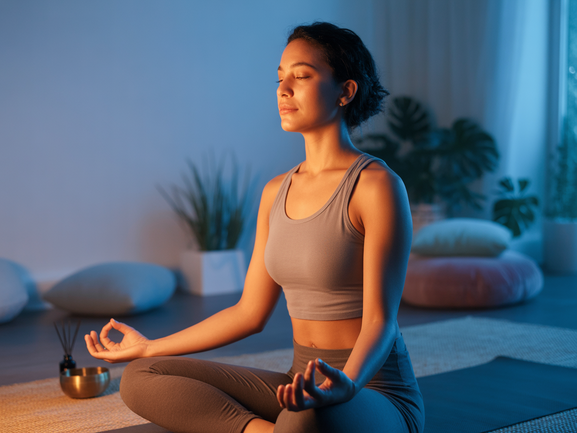Holistic Wellness: A New Path for Mental Health Recovery in 2025
Holistic wellness is a philosophy of health that honors the whole person—body, mind, spirit, and emotions—in the pursuit of optimal well-being. When applied to mental health recovery, this approach integrates powerful complementary practices like yoga, meditation, and mindful nutrition with traditional treatments. It’s a journey of rediscovering balance and inner strength, one intentional breath at a time.
Navigating the path of mental health can often feel isolating and overwhelming. However, recovery is not a single, giant leap but a series of gentle, deliberate steps. If you are searching for natural, supportive methods to complement your mental health journey, you have found a compassionate starting point. This guide explores how a holistic wellness framework can become a powerful ally in managing depression and cultivating lasting emotional balance in 2025.
The Mind-Body Connection: The Cornerstone of Holistic Wellness
At the heart of holistic wellness lies a fundamental truth: your mind and body are not separate entities but an interconnected system. What affects one profoundly influences the other. For example, chronic stress doesn’t just reside in your thoughts; it manifests physically as muscle tension, digestive issues, fatigue, and a weakened immune system. Understanding this is the foundation of mindfulness mental wellness.
Conversely, nurturing your body through gentle movement, nourishing food, and adequate rest can create powerful, positive shifts in your mental state. By adopting practices that honor this mind-body connection, you begin to treat not just the symptoms of depression, but your *whole self*. This perspective empowers you to take an active, hopeful role in your recovery, fostering a renewed sense of agency.

7 Key Holistic Practices for Emotional Balance
Integrating holistic practices into your daily life doesn’t demand a radical overhaul. It’s about discovering small, sustainable activities that resonate with you. Here are seven powerful practices that can support your journey toward emotional balance, with a closer look at how they create change.
1. Yoga for Emotional Release
More than just physical postures, yoga is a form of moving meditation that powerfully unites breath with movement. For those asking, “how yoga helps with depression,” the answer is multi-faceted. The practice of yoga for mental health encourages you to stay present in your body, creating a safe container to process emotions without judgment. Gentle, restorative, or yin yoga flows can be especially beneficial, offering a soft place to land on difficult days. Platforms like the Vitalizen App for Yoga and Meditation offer guided sessions specifically tailored to emotional well-being.
2. Meditation for Mental Clarity
When your mind feels clouded by persistent negative thought loops, meditation can serve as a beacon of clarity. The objective isn’t to silence your thoughts but to observe them without getting entangled. This practice cultivates mental resilience and enhances emotional regulation. Techniques for meditation anxiety relief, such as focusing on the breath or a body scan, provide an immediate anchor to the present moment, offering a sense of calm. A consistent practice can fundamentally reshape your relationship with your thoughts, diminishing their power over your emotional state.
3. Breathwork for Instant Calm
Your breath is one of the most potent and accessible tools for managing anxiety and stress. By consciously slowing and deepening your breath, you send a direct signal to your nervous system that it’s safe to relax. Simple techniques like the 4-7-8 breath (inhale for 4, hold for 7, exhale for 8) or Box Breathing (inhale, hold, exhale, hold, all for 4 counts) can have an immediate grounding effect. This is a simple yet effective form of natural depression treatment you can practice anywhere, anytime.
4. Mindful Movement and Nature Therapy
Mindful movement is about connecting with your body in a joyful, non-judgmental manner. This could be a slow walk in nature, stretching, dancing in your living room, or practicing Tai Chi. The key is to move in a way that feels good for *you*. This practice helps release physical tension, boosts mood-enhancing endorphins, and fosters a more positive and compassionate relationship with your body. It stands as one of the most intuitive wellness practices for emotional balance.
5. Nutritional Psychiatry: Feeding Your Brain
The food you eat directly impacts your brain function and mood. A holistic approach recognizes nutrition as a critical pillar of mental health. Diets rich in omega-3 fatty acids (found in fish and flaxseeds), antioxidants (berries, leafy greens), and probiotics (yogurt, kimchi) can reduce inflammation and support the production of neurotransmitters like serotonin. Limiting processed foods, sugar, and excessive caffeine can also help stabilize mood and energy levels.
6. The Restorative Power of Sleep
Sleep and mental health have a bidirectional relationship. Depression can disrupt sleep, and poor sleep can worsen symptoms of depression. Prioritizing sleep hygiene is a non-negotiable aspect of holistic wellness. Create a relaxing bedtime routine, ensure your bedroom is dark and cool, avoid screens an hour before bed, and aim for 7-9 hours of quality sleep per night. This restorative period is when your brain processes emotions and solidifies learning.
7. Digital Wellness Communities
Recovery is not a journey you must undertake alone. Digital communities, such as those found within wellness apps, provide a space for shared experiences and mutual support. Connecting with others who understand your struggles can significantly combat feelings of isolation. For more insights, exploring articles and tips on yoga and meditation can provide ongoing inspiration and a sense of connection.
The Transformative Benefits of a Holistic Approach
Adopting a holistic framework for mental wellness offers numerous advantages that support and amplify traditional treatments. It empowers you to become an active, engaged participant in your healing journey.
- Empowerment and Agency: It provides practical, self-care tools you can use anytime to manage your emotional state.
- Reduced Stress Hormones: Practices like yoga and meditation are scientifically proven to lower cortisol levels.
- Improved Emotional Regulation: Mindfulness helps you observe your feelings without being overwhelmed by them.
- Increased Body Awareness (Interoception): You learn to listen to your body’s subtle signals, fostering a kinder, more intuitive relationship with yourself.
- Enhanced Neuroplasticity: Consistent practice can physically rewire the brain to favor more positive and resilient thought patterns.
- Holistic Symptom Relief: Addresses related physical symptoms like fatigue, pain, and digestive issues.
According to a 2025 Stanford University study, individuals who integrated mindfulness and yoga into their therapy for 12 weeks reported a 60% greater reduction in anxiety symptoms compared to the therapy-only group.
Source: Stanford School of Medicine Wellness Research, 2025
How to Start Your Holistic Wellness Routine Today
The thought of starting a new routine, especially when low on energy, can be daunting. The secret is to start small—impossibly small. Celebrate these tiny victories to build gentle momentum.
- Choose One Thing: Pick one practice from the list above that feels most accessible and appealing to you right now.
- Set a Tiny Goal: Decide to practice for just 1-5 minutes a day. For example, commit to three deep, conscious breaths or one simple yoga stretch.
- Link it to an Existing Habit: Practice your deep breathing right after you brush your teeth to make it an automatic part of your day. This is called habit stacking.
- Practice Self-Compassion: Some days will be harder than others. If you miss a day, that’s okay. The goal is gentle consistency, not perfection. You can learn more about our philosophy by reading about What is Vitalizen.app?.
What is the Cost of a Holistic Approach?
The cost of implementing holistic wellness can vary widely, making it accessible to nearly everyone. Many of the most powerful practices are completely free, requiring only your time and intention.
Free options include breathwork exercises, mindful walking in a local park, and using free guided meditations on platforms like YouTube. Paid options might include a subscription to a specialized wellness app like Vitalizen, attending yoga classes, or hiring a wellness coach. The investment can range from $0 to several hundred dollars per month, depending on the depth and personalization you seek.
| Practice | Potential Cost | Time Commitment | Key Benefit |
|---|---|---|---|
| Breathwork | Free | 1-5 minutes/day | Immediate Calm |
| Meditation Apps | $0 – $15/month | 5-10 minutes/day | Mental Clarity |
| Yoga Classes | $15 – $30/class | 60-90 minutes/week | Mind-Body Unity |
| Wellness Coaching | $75 – $200/session | Bi-weekly | Personalized Plan |
When to Seek Professional Support
Disclaimer: It is crucial to understand that holistic wellness practices are intended to be complementary supports, not replacements for professional medical advice, diagnosis, or treatment.
If you are experiencing persistent symptoms of depression or anxiety, it is essential to speak with a qualified healthcare provider or mental health professional. They can provide an accurate diagnosis and create a comprehensive treatment plan tailored to your needs. Holistic wellness practices can be a powerful part of that plan, but they should be used in conjunction with, not instead of, professional care. For reliable information, consider resources like the National Institute of Mental Health (NIMH).
Frequently Asked Questions about Holistic Wellness
Can yoga really help with depression?
Yes, absolutely. Numerous studies have shown that a consistent yoga practice can significantly reduce symptoms of depression. It works by lowering stress hormones (cortisol), increasing calming neurotransmitters (GABA), and improving the mind-body connection, which helps in processing emotions and reducing rumination. The combination of physical postures, breathwork, and mindfulness in yoga provides a comprehensive tool for emotional regulation.
What holistic practices are scientifically proven for mental health?
Several holistic practices have strong scientific backing. Mindfulness-Based Stress Reduction (MBSR) and yoga are well-documented by institutions like the UMass Memorial Center for Mindfulness to help with depression and anxiety. Similarly, meditation has been shown to change brain structure in ways that enhance emotional regulation and focus. Breathwork is also proven to quickly activate the parasympathetic nervous system (the ‘rest and digest’ state), inducing a state of calm.
How do I start a wellness routine when I’m feeling depressed?
The key is self-compassion and starting incredibly small. Lack of motivation is a real symptom of depression. Instead of aiming for a big goal, choose one tiny action. For example, roll out your yoga mat. That’s it. Or, open a meditation app. The next day, maybe you do one stretch or listen to one minute of a guided meditation. By making the first step as easy as possible, you reduce internal resistance and build momentum gently over time.
Is it safe to use holistic approaches alongside therapy or medication?
In most cases, yes, it is not only safe but highly beneficial. Holistic practices like yoga and meditation can be excellent complements to traditional treatments. They can help you manage symptoms between therapy sessions and enhance the overall effectiveness of your treatment plan. However, it is always best to discuss any new practices with your doctor or therapist to ensure they are a good fit for your specific situation. You can always contact us for more guidance on our programs.
Your path to wellness is uniquely your own. By embracing holistic wellness practices, you are not just treating symptoms; you are nurturing your entire being back to a state of balance, vitality, and hope.
🎯 Ready to start? If you feel ready to take a small, gentle step today, we invite you to start your wellness journey now. Discover guided yoga, meditation, and mindfulness practices on the Vitalizen App, a supportive space designed to meet you exactly where you are. The path to feeling better can begin with a single, conscious breath.

